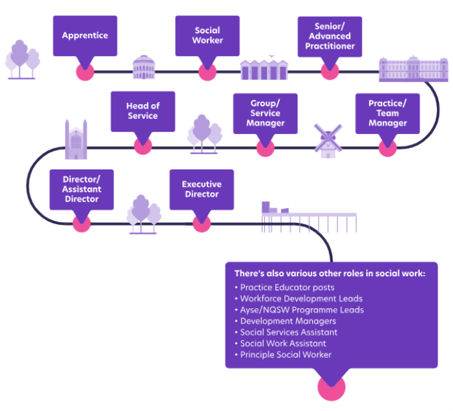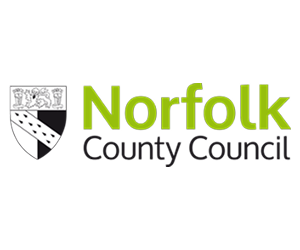A career in Children’s Social Work is like no other
There are three main routes to become a qualified social worker, and to gain your Social Work England recognised degree. If the degree route isn’t for you, there are still many roles and career paths available within the children’s social work space that you can pursue without a formal qualification.
To find out more about the individual opportunities that our authorities can offer to start your career in children’s social work, take a look at our authority pages.
Gaining a degree in social work
The most common route into social work is through gaining a recognised undergraduate Social Work degree from university. Entry requirements will differ, but most will require around 2 A-levels, plus 5 GCSEs, including English and Maths, at grade C or above.
Fast track courses
If you already have a degree qualification in another field of study or that is unrelated to social work, another route to starting your career in children’s social work is to complete a fast-track postgraduate course, such as the Step up to Social Work programme.
Apprenticeships
Many of our 11 authorities offer Apprenticeship schemes which allow you to gain your degree whilst gaining practical, on the job experience. Whilst working, you’ll have dedicated time for your studies as part of a structured programme to gain your formal qualifications – all the while earning a salary for the work you do.
Your Assessed and Supported Year in Employment (AQYE)
Once you’ve gained your degree and become a newly qualified Social Worker, many of our authorities host Your Assessed and Supported Year in Employment (ASYE) programmes to further develop your skills, knowledge and professional confidence.
Abigail’s Journey into Social Work
Discover how Abigail began her career in children’s social work through the Graduate Trainee Programme and her experiences working within the Eastern Region so far.
Career Progression in Social Work
Over the past few years, the pathways to enter and progress within the field of social work have expanded, offering a wider array of opportunities for individuals to pursue their chosen education and qualifications to continue their fulfilling career. Through these avenues, Social Workers can enhance their contributions in improving the lives of children and young people, and their families.
Depending on whether you began your career via a BA (Hons) degree or through direct work experience, there are many opportunities for you to gain qualifications and routes to help you in progressing within your career in Social Work.
Find out more below about the various courses and programmes that could help you to progress further in your career in Social Work.

BA (Hons) in Social Work
Many university degree courses accept applicants without prior professional experience in social work. However, certain Social Work degrees also admit individuals who are already working as frontline practitioners. Some courses may offer flexible distance learning, enabling you to continue your current role whilst studying.
To find out more about the BA (Hons) options available to you, reach out to your relevant authority.
Step Up To Social Work
Step Up to Social Work offers an intensive, 14-month, full-time programme. If you aspire to become a social worker but lack a degree in social work, this programme provides an opportunity for training.
To qualify for program application, you must have:
- Completed an undergraduate degree (Level 6)
- Accumulated 6 months of full-time (or equivalent) direct experience, paid or voluntary, working with vulnerable children, young people, families, carers, or vulnerable adults
- Achieved GCSEs in English and Mathematics at Grade 4 (C) or higher (or an approved equivalent).
Once you successfully complete the programme, you will qualify with a Postgraduate Diploma in Social Work.
Keep in mind that applications open and close depending on the time of year.
To find out more about the Step Up to Social Work programme, visit the Government website.
Masters Degree (MA) in Social Work
The Graduate Trainee Scheme, or Masters Degree (MA) is a 3 year programme commencing every September. It welcomes applications from individuals who have attained a 2.1 degree within the past 5 years.
Upon finishing, you will need to return to work in a frontline team in Children and Young People’s Services (CYPS) or Adults Social Care for at least 2 years.
To find out more about the Masters Degree (MA) options available to you, reach out to your relevant authority.
Masters Degree (MA) in Social Work – Shortened Pathway
Several universities in the Eastern Region provide a two-year full-time Master’s programme in Social Work tailored for current SCC frontline practitioners. This Master’s degree is designed for individuals who have attained a 2:1 undergraduate degree and possess a minimum of 18 months of frontline experience.
To find out more about the Masters Degree (MA), shortened pathway options available to you, reach out to your relevant authority.
The Think Ahead Programme
The Think Ahead Programme offers a paid two-year training course designed to guide you towards achieving a master’s degree in social work. This programme is an innovative initiative in the UK dedicated to tackling the significant shortage of mental health social workers.
To qualify, applicants must hold a 2:1 undergraduate degree and demonstrate experience or a keen interest in mental health and social care.
For further details about the programme, please visit the website.
Return to Social Work Programme
Several authorities in the Eastern Region provide a Return to Social Work programme for qualified Social Workers seeking to re-enter the profession after a break. The programme comprises supervised practice placements and self-directed study aimed at updating your knowledge, skills, and experience.
For further details about this programme, please visit the website.
Tunde’s Career Progression in Social Work
Discover how Tunde entered a career in Social Work and how his career progressed.
Looking for a job in Children’s Social Work? Search here…
Working in Social Work
These are the latest Social Work articles from our colleagues across the 11 regions that make up the Eastern Region…
















